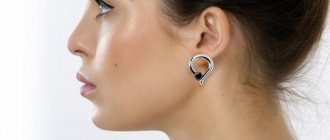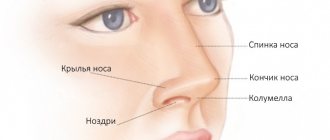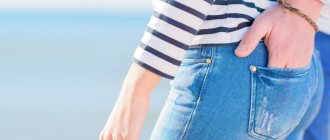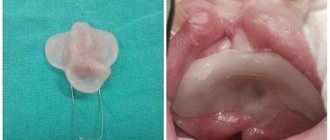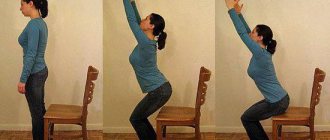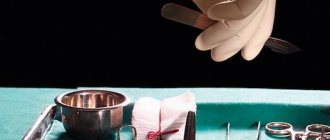Its drooping becomes a serious problem because it violates the accepted aesthetic proportions - the nasolabial angle acquires the wrong degree - less than 90°, and the symmetry of the face is also generally disturbed.
The drooping becomes more pronounced with age, when gravitational ptosis is already clearly visible - the skin of the back and tip loses its elasticity and firmness, the tip becomes thicker and droops more and more.
You can raise the tip of the nose either with or without surgery - with the help of fillers, threads, Botox, etc. Let's take a closer look at all the possible methods for correcting the defect.
Clamps and splints
On sale you can find nasal correctors from the brands NoseUp, Rhinocorrect, etc. These are clips that are attached to the nose. They need to be worn 2-3 hours a day so that, according to the manufacturers, a result comparable to plastic surgery appears.
In fact, correctors are completely ineffective. You cannot fix your nose by putting short-term pressure on it.
A splint is a device made of plaster or plastic. It is used to correct the contour of the nose. The splint puts pressure on the cartilage and corrects defects - it narrows the wings, raises the tip, smoothes out the hump (if it is completely cartilaginous). However, you don’t need to expect colossal changes - the correction will be very minor, and the effect will be short-lived if you stop using the corrector.
Rehabilitation
After the completion of surgical manipulations, gauze turundas are inserted into the nose, and a fixing plaster bandage is applied on top, which is removed 7-10 days after rhinoplasty.
After the cast is removed, the area will need to be washed regularly with antiseptic agents. The swelling subsides, on average, after two weeks. During this period, it is recommended to sleep only on your back. During recovery, it is necessary to avoid physical activity, visiting baths, and exposure to ultraviolet rays.
"Dr. Panov's Clinic" is a multidisciplinary medical center that provides a wide range of plastic surgery services. We perform high-quality rhinoplasty, correcting an upturned nose and other aesthetic defects of any complexity!
Exercises (face building)
The author of the most effective technique is Carol Maggio. She has developed a whole set of exercises for face-building, which can be found in her book. It all started with the fact that Carol herself was able to change the tip after an unsuccessful rhinoplasty.
By the way, these exercises are recommended for people without pronounced defects. They will help keep your nose young and beautiful longer.
Example exercise to raise the tip:
1) With the index finger and thumb of your right hand, grasp and pinch your nostrils tightly. Place the index finger of your left hand on the tip with the pad up and lift it. At this moment the upper lip rises.
2) While in the starting position, tense your upper lip and lower it, resisting the nasal muscles.
3) Repeat every day 40 times. The effect will be noticeable after 2-3 months, but the exercises must be continued constantly.
Straightening the tip of the nose
Most girls ask the question: “How to reduce your nose at home?” But there is another popular problem - the tip of the nose is slightly curved. Asymmetry can also be corrected with the help of special exercises. In this case, you can overcome the incorrect position of the tip, but such manipulations are not suitable for eliminating the hump. The exercise is quick and easy:
- You need to take an IP, which is completely identical to that in gymnastics from Carol Maggio, described above.
- But in this case, the tip of the nose should not point down, but in the direction completely opposite to the curvature.
- You need to repeat it about 40 times in a row. It is advisable not to stop performing it, even if the curvature has already been corrected. This way you can maintain the correct shape of your nose.
Application of threads
The thread technique allows you to slightly raise the tip. The essence of the procedure is that the doctor inserts strong threads with notches into the tissue through micropunctures with a special needle. Thanks to the counter arrangement of notches on the threads, the skin and soft tissues are raised. Next, the threads are fixed in the desired position and become a frame that prevents the soft tissue from descending. To lift the tip, threads are passed through the cartilage and secured at the top of the nose.
Two days later, the cosmetologist trims the ends of the threads, after which the final result appears. It lasts for approximately three years.
Advantages of threads:
- minimum swelling and bruising;
- no significant complications;
- tissues are not affected in large quantities;
- speed of the procedure – about 20 minutes;
- no general anesthesia.
Cause of a hump on the nose
A hump on the nose is a defect in which there is an unevenness on the back of the nose associated with a congenital structural feature or a deformity acquired as a result of injury. It is customary to identify several reasons for the appearance of a hump.
- Ethnic trait.
For representatives of some nationalities, a hump is a common external feature of the structure of osteochondral tissue, and therefore is not a defect as such. The desire to change the shape of the nose and remove the hump in this case may be due to a psychological factor and the desire to Europeanize facial features. - Using heavy glasses.
A hump on the nose is a popular defect among patients who are forced to constantly wear glasses with heavy frames and lenses. Deformation of the osteochondral tissue is quite natural with frequent and strong pressure on the nose. - Post-traumatic complications.
Once the tissues of the nose are damaged, they may not heal properly, which can lead to the formation of a defect such as a hump.
Advantages of the nasal hump correction method without surgery
Despite the fact that a non-surgical technique that corrects the shape of the nose provides only a temporary effect that lasts approximately 8-12 months, it has many advantages over rhinoplasty:
- No need for general anesthesia.
Now you can remove the defect and form a beautiful nose shape under local anesthesia. - Fast procedure.
A cosmetologist only needs 10-20 minutes to perform all the necessary manipulations, while a surgical operation requires about an hour or more. - Minimal risks of complications.
Unlike rhinoplasty techniques, non-surgical nose correction almost never causes significant swelling, pain, bruising or bleeding. - Instant recovery.
Rehabilitation takes only 1 day, and the patient has the opportunity to return to their normal rhythm of life almost immediately. - The ability to understand whether surgery is needed in the future.
Sometimes non-surgical correction of the shape of the nose allows you to clearly see how the general features of the face change.
How is the nose correction procedure performed without surgery?
To carry out non-surgical correction of the shape of the nose, special cosmetic fillers based on hyaluronic acid or collagen are used. In our clinic, the cosmetologist most often uses the well-known drugs Surgiderm, Restylane, Perlane, the effectiveness and safety of which have been confirmed by numerous clinical studies.
The drug is injected along the entire length of the bridge of the nose and, thus, allows you to create more correct proportions, leveling out the hump and other existing irregularities. Fillers fill in the depressions, correcting the contours of the nose, making them more accurate and smooth. Today, this minimally invasive method is very popular among patients who do not want to sign up for rhinoplasty.
Effect after removing a hump on the nose without surgery
The non-surgical method of nose correction allows not only to remove the hump, but also to slightly change the shape and eliminate other mild defects:
- smoothing out the dimple on the bridge of the nose;
- slight change in the tip of the nose;
- elimination of asymmetry;
- alignment of the nasal bridge;
- smoothing the sharp corners of the bridge of the nose.
The procedure is suitable not only for patients who are not satisfied with a hump nose, but also for those who would like to slightly lift the tip of the nose and achieve a rejuvenation effect in this area. The resulting effect cannot last a lifetime, because after 8-12 months the injected filler is gradually removed from the body, which leads to a complete restoration of the original shape of the nose.
Contraindications
The procedure is not performed if the patient has contraindications to it:
- diabetes;
- acute inflammatory diseases;
- individual intolerance to the drug used for shape correction;
- pregnancy and lactation in women;
- herpes in the acute stage;
- elevated temperature;
- recent surgeries affecting the nose or other organs;
- severe runny nose;
- infectious diseases.
Precautions when performing nose exercises
- Before you start face-building, it is important to thoroughly wash and dry your hands, rub your palms so that they become warm. Nails must be carefully processed and not leave scratches.
- In 20–30 minutes. Before performing gymnastics, it is advisable to apply massage oil, cream or ointment to the skin; they will nourish the skin, give it a healthy appearance and reduce the risk of injury.
- Gymnastics should not cause pain; if pain occurs, the pressure should be reduced.
Immediately after exercise, fragile muscles become toned, and positive changes can be observed over the course of several hours. This signals that everything was done correctly.
Not all defects of the nose can be corrected through exercises to reduce the size of the nose, but gymnastics can significantly improve the appearance, prolong youth, prevent facial features from drooping, and restore impaired respiratory functions.
Author: Liliya Razzhivina (Meerjungfrau)
Reducing the nose with cosmetics
Of course, miracles do not happen, and the nose will not become smaller or straighter with a wave of a magic brush. But there are a lot of tricks that will help you visually reduce the size of your nose, or distract attention from its flaws. For example, the dense texture of a well-chosen foundation will allow you to remove the emphasis from a large nose. To do this, you need a foundation of 3 shades:
- the first should practically blend with the color of your skin;
- the second one should be a tone darker than the first;
- the third is a tone lighter
When applying makeup, the first one is used as a base, and the other two are used as correctors. Cosmetology will also help greatly in reducing a long nose. Powder with shimmering particles will come to the rescue, which must be applied to the cheekbones. Then apply powder to match your skin tone. When applying makeup to reduce a large nose, you need to be careful about the entire makeup. It is worth focusing on the lips and eyes, which will make the face more harmonious and distract attention from the large nose. Hairstyle also plays a significant role. A large nose is emphasized by long straight hair, so you should wear your hair to your shoulders and make your bangs torn or oblique. A voluminous hairstyle and blonde hair can also visually reduce the length of your nose.
Methods for correcting the shape of the nose
Plastic surgery that helps correct imperfections in the appearance of the nose is called rhinoplasty. By doing this you can fix:
- ● snub nose;
- ● length;
- ● humps;
- ● ugly tip;
- ● curved septum and other defects.
Surgical intervention, which allows both to straighten the nose after a fracture and to eliminate congenital defects, can be:
- ● open when the cuts occur on the outside. Used if significant correction is required;
- ● closed. In this case, the surgeon cuts the nose from the inside. Typically used for less serious surgeries.
The procedure is performed under general anesthesia and takes on average one or two hours. The recovery period lasts approximately six months to a year. Only after this time will the nose take the desired shape.
Types of rhinoplasty:
- ● primary – carried out for the first time, often there are medical indications for it (for example, difficulty breathing);
- ● corrective – performed after the first operation if the nose does not heal exactly as the patient wishes. It takes about half an hour and requires only local anesthesia;
- ● secondary – a more complex event, which is aimed at correcting the results of a poorly performed first rhinoplasty. Unfavorable rehabilitation is also an indication.
A separate method is contour. It is carried out by introducing fillers and allows you to correct minor imperfections: slight asymmetry, smooth out the tip, etc. It is not possible to straighten the nasal septum without surgery.
If you are interested in how to correct the shape of the olfactory organ, contact qualified doctors at VIP Clinic. We will conduct a full diagnosis, determining whether the defect is purely cosmetic or has an impact on health. Depending on this, an individual scheme is selected, which can combine various methods.
Facebook building is a new solution in cosmetology
Cosmetologists have conducted numerous studies and proven that the use of face building (facial gymnastics) gives excellent results. It is this technique that is put on a par with plastic surgery, since with the right approach and regular exercises the result will be amazing.
Gymnastics itself involves a preliminary selection of the program that is necessary for each specific option. Cosmetologists offer several complexes: for noses with a hump, for long or potato noses. Some techniques involve eliminating several defects at once.
Contraindications to nasal gymnastics
Facebuilding activities should be postponed or stopped altogether if:
| Problem | Cause | Consequence |
| Neck problems (hernia, sprain, osteochondrosis and injuries) | Overloading the muscles will aggravate existing problems and prolong the recovery period. | Postpone until recovery |
| Herpes | There is a danger of spreading infection. | Postpone until wounds are completely healed. |
| Oncological diseases | Insufficient research into the effects of exercise does not rule out its negative impact on cancer. | Specialist consultation required |
| Pregnancy period | It is undesirable to overstrain the abdominal muscles, so as not to cause uterine tone and create a threat of miscarriage. | Postpone until after birth |
| Injuries, inflammations and unhealed wounds of the nose, traumatic brain injuries | There is a risk of deterioration, additional muscle trauma and an increase in the recovery period. | Postpone until complete healing |
| Surgery and facial plastic surgery, immediately after Botox injections and cosmetic procedures | There is no guarantee that until the muscles have fully recovered from mechanical impact on them, gymnastics will not cause harm. | The first 2 years are contraindicated; further consultation with a specialist is required. |
| Poor health, hypertension, fever, hypertensive crisis, dilated blood vessels, problems with the lymphatic system, exacerbation of diseases, inflammation of the facial nerves. | The risk of worsening existing health problems increases. | Postpone until problems disappear; if cure is not possible, stop |
Maximum lengthening of the nose due to a massive graft
For maximum lengthening of the nose during rhinoplasty, it is necessary to use a more massive lengthening septal graft. In 2000, Hubbard proposed using a more rigid anchorage for the septal extension graft, anchoring it as a nasal dorsum extension graft. One of the most popular techniques for this type of graft use is the tongue-in-sulcus technique, in which a nasal septum extension graft is secured between two nasal dorsum extension grafts. This rhinoplasty technique allows you to maximally lengthen even the shortest nose and make it much more refined and attractive.
Share:
